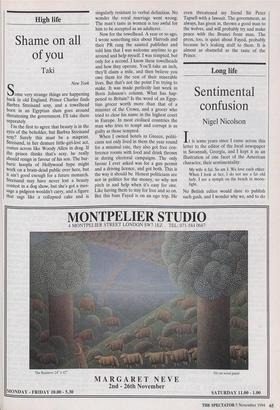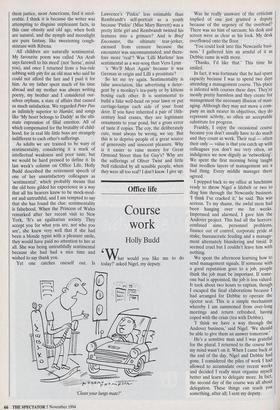Long life
Sentimental confusion
Nigel Nicolson
It is some years since I came across this letter to the editor of the local newspaper in Savannah, Georgia, and I kept it as an illustration of one facet of the American character, their sentimentality:
My wife is fat. So am I. We love each other. When I look at her, I do not see a fat old lady. I see a nymph on the beach in moon- light.
No British editor would dare to publish such gush, and I wonder why we, and to do them justice, most Americans, find it intol- erable. I think it is because the writer was attempting to disguise unpleasant facts, in this case obesity and old age, when both are natural, and the nymph and moonlight are pure fantasy, like sweetening cough- mixture with Ribena.
All children are naturally sentimental. My favourite poem was called 'An Arab says farewell to his steed' (not 'horse', mind you), and once I returned from a bus-ride sobbing with pity for an old man who said he could not afford the fare and I paid it for him. As my father spent much of his time abroad and my mother was always writing poetry, my brother and I considered our- selves orphans, a state of affairs that caused us much satisfaction. We regarded Peter Pan as infinitely superior to Hamlet, and songs like 'My heart belongs to Daddy' as the ulti- mate expression of filial emotion. All of which compensated for the brutality of child- hood, for in real life little boys are strangely indifferent to each other's sufferings.
As adults we are trained to be wary of sentimentality, considering it a mark of intellectual weakness and poor taste, but we would be hard pressed to define it. In last week's column on Office Life, Holly Budd described the retirement speech of one of her unsatisfactory colleagues as `sentimental', which probably means that the old bore gilded his experience in a way that all his hearers knew to be mock-mod- est and untruthful, and I am tempted to say that she has found the clue: sentimentality is falsehood. When the Princess of Wales remarked after her recent visit to New York, 'It's an egalitarian society. They accept you for what you are, not who you are', she knew very well that if she had been a blonde typist with a pleasant smile, they would have paid no attention to her at all. She was being untruthfully sentimental because she had had a nice time and wished to say thank you.
Yet one catches oneself out. Is Lawrence's 'Pinkie' less estimable than Rembrandt's self-portrait as a youth because 'Pinkie' (Miss Mary Barrett) was a pretty little girl and Rembrandt twisted his features into a grimace? And is Brief Encounter, the ultimate tear-jerker, excused from censure because the encounter was unconsummated, and there- fore more 'real'? Was 'Lill Marlene' less sentimental as a war-song than Vera Lynn 's 'We'll Meet Again' because it was German in origin and Lilli a prostitute?
So let me try again. Sentimentality is false association, like advertising a deter- gent by a monkey's tea-party or by kittens boxing each other. It is sentimental to build a fake well-head on your lawn or put carriage-lamps each side of your front door. If you have inherited a pair of 18th- century lead cranes, they are legitimate ornaments to your pond, but a gross error of taste if copies. The coy, the deliberately cute, must always be wrong, we say. But this is to deprive people of a great source of generosity and innocent pleasure. Why is it easier to raise money for Great Ormond Street than for Guy's? Why are the sufferings of Oliver Twist and little Nell ridiculed by all sensible people, when they were all too real? I don't know. I give up.











































































 Previous page
Previous page